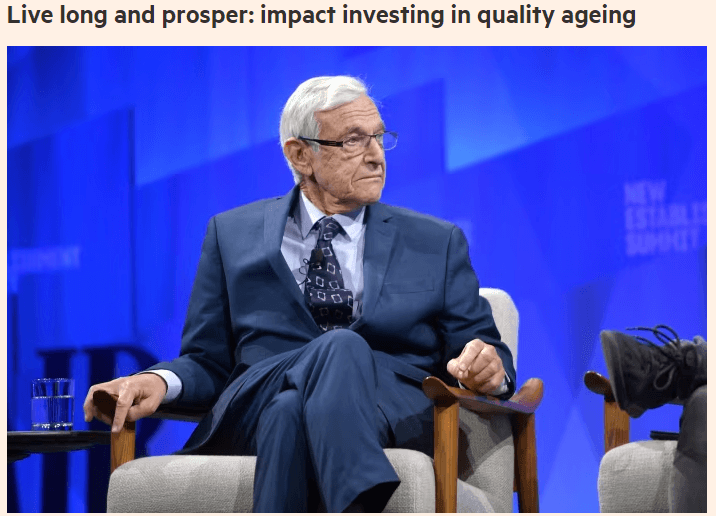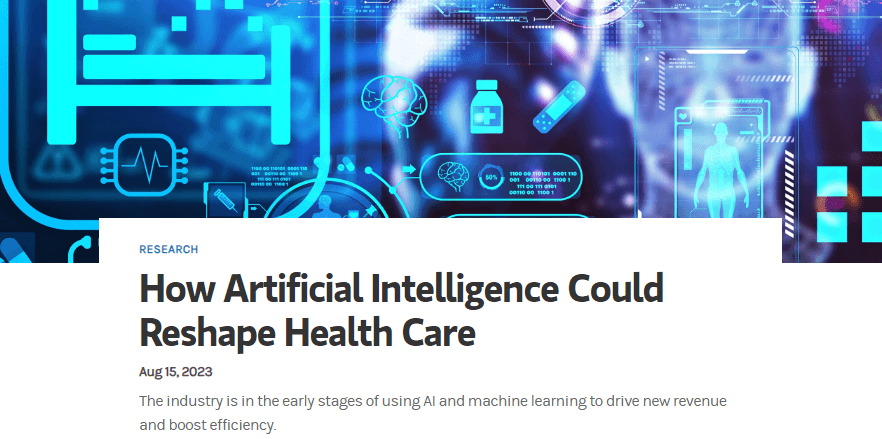In an era where the confluence of technology and healthcare is reshaping the contours of medical care and patient experience, investors stand at the cusp of a transformative opportunity.
Healthcare, marked by rapid technological advancements and an aging global population, presents a complex yet fertile landscape for investment. As we delve into the intricacies of impact investing, the revolutionary potential of AI, and the transformative power of digital payment systems, a compelling narrative unfolds — one that underscores the pivotal role of innovation in addressing the multifaceted challenges of modern healthcare.
The advent of impact investing in the healthcare sector heralds a paradigm shift towards sustainable and inclusive growth. As societies grapple with the demographic realities of an aging population, the imperative for investments that not only yield financial returns but also generate tangible societal impacts has never been more pronounced. The concept of quality aging, emphasized in the discourse on impact investing, reflects a holistic approach to the challenges and opportunities presented by longevity. This perspective not only redefines the investment landscape but also highlights the potential for innovative solutions that enhance the quality of life for the elderly, thereby addressing a critical need within the healthcare ecosystem.
Parallel to the rise of impact investing is the transformative influence of AI and ML technologies in healthcare. This sector stands on the brink of a revolution, with AI poised to redefine drug discovery, diagnostics, patient care, and operational efficiencies.
As AI/ML technologies continue to evolve, their integration across the healthcare spectrum signifies a shift towards more personalized, efficient, and accessible care—a shift that presents both challenges and opportunities for investors.
This landscape is characterized by a unique interplay between technological innovation, demographic trends, and investment strategies, each contributing to the overarching goal of transforming healthcare.
Let’s dive in …
Can impact investors help us age?

The concept of “impact investing” has increasingly become synonymous with the pursuit of sustainable and inclusive growth, particularly within the context of an aging society. The article “Can impact investors help us age?” elucidates the profound implications of this investment strategy on the healthcare sector, especially concerning quality aging.
The discourse unfolds with an insightful exposition on the demographic realities shaping the investment landscape—where longevity is no longer an abstract concept but a palpable reality demanding innovative financial solutions.
Patricof’s venture, Primetime Partners, epitomizes the essence of impact investing in the realm of quality aging, targeting early-stage companies dedicated to improving the lives of older adults. This initiative is reflective of a broader investment philosophy that sees aging not merely as a challenge to be managed but as an opportunity to be harnessed.
Central to the discussion is the burgeoning field of companies that are making significant strides in catering to the needs of the elderly. Examples such as Aidaly, which facilitates access to financial support for caregivers, and Duos, offering navigational assistance in healthcare benefits, underscore the tangible impacts of these investments. These companies exemplify how targeted financial injections can spur innovations that directly enhance the well-being of the elderly, addressing critical areas such as healthcare access, social inclusion, and the overall quality of life.
The nuanced perspective on the interplay between philanthropy and investment offers a realistic appraisal of the multifaceted approach needed to tackle the issues at hand. The narrative is candid about the potential pitfalls, including the risks of exacerbating inequalities and the critical need for inclusivity in investment strategies. This balanced viewpoint underscores the importance of a holistic approach that integrates financial objectives with societal goals, highlighting the indispensable role of innovation and empathy in crafting solutions that are both profitable and impactful.
Read the full article here.
How Artificial Intelligence Could Reshape Health Care

AI/ML offers a glimpse into a future where these technologies not only augment existing practices but also catalyze the creation of novel therapeutic modalities and care delivery models. This exploration into AI’s potential within healthcare provides critical insights into how investors can navigate this evolving landscape, emphasizing areas ripe for innovation and investment.
A pivotal Morgan Stanley Research survey highlights that a significant majority of healthcare entities have already begun integrating AI/ML technologies into their operations, with projected budget allocations for these technologies expected to nearly double within a short span. This robust investment in AI/ML underscores the healthcare industry’s commitment to harnessing these technologies for transformative change.
The article underscores AI’s role in enhancing the efficacy of clinical trials, improving the success rates of preclinical developments, and thereby potentially reducing the time and financial resources required to bring new therapies to market. With more than a hundred drug and biologic applications incorporating AI/ML components submitted to the U.S. Food and Drug Administration in a single year, the trend is clear: AI is set to significantly impact the biopharma industry by accelerating the pace of innovation and increasing the probability of clinical success.
Beyond the pharmaceutical sphere, AI/ML technologies are making inroads into health services and technology sectors, promising to redefine the delivery of care.
The predictive capabilities of AI are particularly highlighted for their potential to facilitate early disease detection and diagnosis, thereby improving patient care and outcomes. Moreover, AI is poised to revolutionize administrative aspects of healthcare, from patient scheduling and risk coding to claims processing and supply chain management, promising to alleviate the operational burdens that currently plague the sector.
The article also casts a spotlight on the instrumental role of AI in leveraging vast data sets for advanced diagnostics and personalized medicine. The convergence of genomic data, electronic health records, and AI-powered analytics is set to foster a paradigm shift towards personalized healthcare, where treatment plans are tailored to the individual’s genetic makeup, lifestyle, and health history. This data-driven approach not only enhances the precision of diagnostics but also opens up new vistas for targeted therapies, epitomizing the shift from a one-size-fits-all model to personalized care paradigms.
For investors, the article delineates a landscape rife with opportunities, identifying biopharma, healthcare services and technology, diagnostics, and medical technology as key sectors where AI/ML innovations promise significant returns.
Read the full article here.
Enabling Fair, Accessible and Friction-Free Healthcare

The intersection of healthcare and digital innovation presents a promising avenue for transformative change, particularly through the lens of payment systems. The article, Painless payments: enabling fair, accessible, and friction-free healthcare, delves into the burgeoning potential of digital payment solutions to significantly enhance the efficiency, accessibility, and consumer experience within the healthcare sector. This narrative not only underscores the challenges posed by traditional payment mechanisms but also highlights how innovative payment solutions can address these issues, thereby supporting more resilient healthcare businesses and benefiting consumers at large.
Central to the discourse is the case study of Health First, a Florida-based network of hospitals and diagnostic centers, which exemplifies the tangible benefits of digitizing payment processes. By adopting a technology platform that automates front-end verification, eligibility, estimating, and propensity to pay, Health First has achieved remarkable efficiency, with 75 percent of premiums collected automatically each month. This shift not only alleviates the administrative burden but also underscores the wider potential of technology to resolve one of healthcare’s most daunting challenges: the complexity and inefficiency of payments.
With the rapid growth of telehealth, particularly accelerated by the COVID-19 pandemic, there emerges a substantial opportunity for healthcare providers to innovate their payment systems. The integration of digital payments into telehealth services not only promises to reduce the high costs associated with face-to-face care but also enhances the convenience and accessibility of healthcare services for patients. This is particularly pertinent in regions like Asia, where digital payments have seen widespread adoption, setting a precedent for their potential impact on healthcare.
Innovative payment solutions, such as AI-based budgeting tools and flexible payment plans, offer the dual advantage of enhancing patient engagement while optimizing expenditure.
The transition towards digital payment solutions in healthcare represents a fertile ground for investment, promising not only to yield substantial returns but also to drive significant improvements in the healthcare experience for all stakeholders.
Read the full article here.
The intersection of impact investing, AI, and digital payment innovations within healthcare not only reveals the sector’s complexity but also its potential for transformative growth.
The insights gleaned from these developments underscore the importance of adaptability, foresight, and a commitment to integrating technological advancements with a deep understanding of societal needs. The journey through the realms of quality aging, AI’s revolutionary impact, and the efficiency of digital payments paints a vivid picture of a sector at the brink of a new era—an era where innovation drives not just financial returns but meaningful improvements in healthcare outcomes.
The discourse on impact investing in the context of quality aging elucidates a pivotal shift towards investments that yield dual returns: financial and societal. As populations age, the demand for solutions that enhance the quality of life for the elderly presents significant investment opportunities. However, these opportunities demand a nuanced approach, one that balances profitability with the imperative to address the complex challenges of aging. This translates into a strategic imperative to seek out ventures that not only promise substantial returns but also contribute to the societal good, fostering an ecosystem where aging is not merely managed but embraced as an opportunity for innovation and growth.
The integration of Artificial Intelligence and Machine Learning technologies across the healthcare spectrum offers a glimpse into the future of medical care, diagnostics, and patient management. The transformative potential of AI in healthcare is immense, promising to accelerate innovation, improve patient outcomes, and optimize operational efficiencies. For investors, this highlights the critical need to stay abreast of technological advancements, investing in AI-driven solutions that have the potential to redefine healthcare delivery. The strategic allocation of capital towards AI in healthcare not only positions investors at the forefront of technological innovation but also aligns them with the broader trends shaping the future of healthcare.
The journey through the evolving landscape of healthcare investment reveals a sector ripe with opportunities for those willing to embrace innovation and adapt to the changing dynamics of healthcare needs and technologies.
In conclusion, the future of healthcare investment is intrinsically linked to the sector’s ongoing technological and societal transformations.
Until next time,
The Longr Reads Team
“The future is not something we enter. The future is something we create.”
Leonard I. Sweet
Longr Reads’ of the Week
- Investing in Longevity Tech (Alumni Ventures)
- Podcast: Innovating for Longevity – VC and Aging with Alan Patricof (Worth)
- From Longevity to Aging In Place (Crunchbase News)


